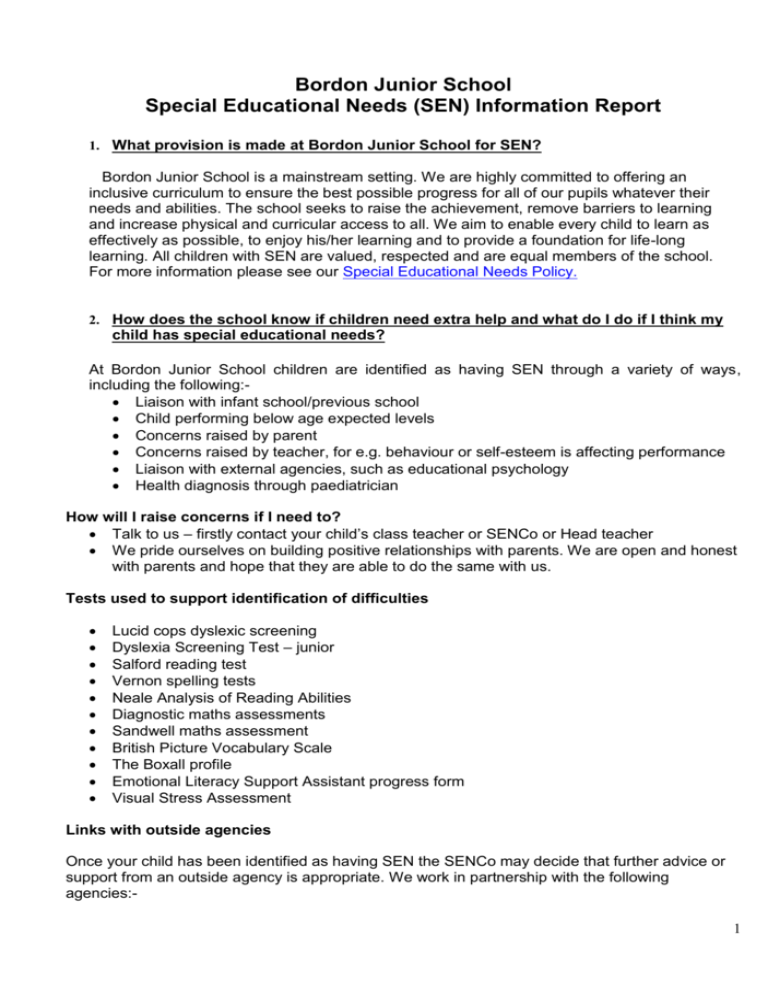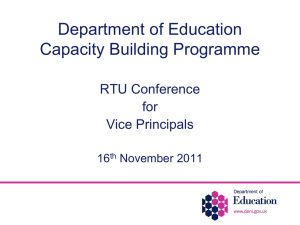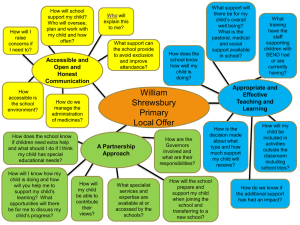(SEN) Information Report
advertisement

Bordon Junior School Special Educational Needs (SEN) Information Report 1. What provision is made at Bordon Junior School for SEN? Bordon Junior School is a mainstream setting. We are highly committed to offering an inclusive curriculum to ensure the best possible progress for all of our pupils whatever their needs and abilities. The school seeks to raise the achievement, remove barriers to learning and increase physical and curricular access to all. We aim to enable every child to learn as effectively as possible, to enjoy his/her learning and to provide a foundation for life-long learning. All children with SEN are valued, respected and are equal members of the school. For more information please see our Special Educational Needs Policy. 2. How does the school know if children need extra help and what do I do if I think my child has special educational needs? At Bordon Junior School children are identified as having SEN through a variety of ways, including the following: Liaison with infant school/previous school Child performing below age expected levels Concerns raised by parent Concerns raised by teacher, for e.g. behaviour or self-esteem is affecting performance Liaison with external agencies, such as educational psychology Health diagnosis through paediatrician How will I raise concerns if I need to? Talk to us – firstly contact your child’s class teacher or SENCo or Head teacher We pride ourselves on building positive relationships with parents. We are open and honest with parents and hope that they are able to do the same with us. Tests used to support identification of difficulties Lucid cops dyslexic screening Dyslexia Screening Test – junior Salford reading test Vernon spelling tests Neale Analysis of Reading Abilities Diagnostic maths assessments Sandwell maths assessment British Picture Vocabulary Scale The Boxall profile Emotional Literacy Support Assistant progress form Visual Stress Assessment Links with outside agencies Once your child has been identified as having SEN the SENCo may decide that further advice or support from an outside agency is appropriate. We work in partnership with the following agencies:1 Family Support Adviser School Nurse NHS Solent Therapy Team – Occupational Therapy/Speech and Language/Physiotherapy Alex Kelly – Speech and Language Therapy Educational Psychology Service Specialist Teacher Advisory Service Primary Behaviour Service Hollywater School outreach teacher Hampshire Ethnic Minority and Traveller Achievement Service including access to their SENCo Child & Adolescent Mental Health Services (CAMHS) Hampshire Children’s Services How will school support my child? Who will oversee, plan, work with my child and how often? Our SENCO oversees all support and progress of any child requiring additional support across the school. • The class teacher will oversee, plan and work with each child with SEND in their class to ensure that progress in every area is made. There will be a Learning Support Assistant (LSA) working with your child either individually or as part of a group if this is seen as appropriate by the class teacher and SENCo. In some circumstances an intervention may be led by the SENCo. The interventions and timetabling of support will be explained to parents in advance. Based on the support and provision already given to a child with SEN a decision will be made regarding additional support for SATs at the end of Key Stage Two. Class Teacher, SENCo, Head Teacher and Parents will be involved in the decision making process. Who will explain this to me? • If your child has an Individual Education Plan (IEP) teachers will share your child’s targets with you following each review. • The class teacher will meet with parents twice yearly at Parents’ evening to discuss your child’s needs, support and progress. For pupils of a higher need there will be more regular meetings throughout the year. • For further information the SENCo is available to discuss support in more detail. 3. How will both you and I know how my child is doing and how will you help me to support my child’s learning? How are the Governors involved and what are their responsibilities? • • • The SENCo reports to the Governors every term to inform them about the progress of children with SEND; this report does not refer to individual children and confidentiality is maintained at all times. One of the Governors is responsible for SEN and meets regularly with the SENCo. They also report to the Governors to keep all informed. The Governors agree priorities for spending within the SEN budget with the overall aim that all children receive the support they need in order to make progress. How do we know if it has had an impact? • By reviewing children’s targets on IEPs and ensuring they are being met 2 • • • The child is making progress academically against national/age expected levels and the gap is narrowing – they are catching up to their peers or expected age levels. For the majority of pupils this means making accelerated progress or ‘back on track’ working at age related expectations. For a small minority, incremental progress is monitored against specific targets. Verbal feedback from the teacher, parent and pupil. Children may move off of the SEN register when they have ‘caught up’ or made sufficient progress. How will the curriculum be matched to my child’s needs? What are the school’s approaches towards differentiation and how will that help my child? • • All work within class is pitched at an appropriate level through differentiation so that all children are able to access according to their specific needs. The benefit of this type of differentiation is that all children can access a lesson and learn at their level. How are the school’s resources allocated and matched to children’s SEN needs? • We ensure that all children who have Special Educational needs are met to the best of the school’s ability with the funds available. • We have a team of LSAs who are funded from the SEN budget and deliver programmes designed to meet groups of children’s needs. • The budget is allocated on a needs basis. The Children who have the most complex needs are given the most support. • We have a number of specialist rooms available, including a Sensory room and the Skills Zone, where we have access to specialist resources to best support your child. • The school is committed to being fully inclusive and allocates sufficient resources to each child to ensure they are successful. How is the decision about what type and how much support my child will receive? • • • The class teacher alongside the SENCo will discuss the child’s needs and what support would be appropriate. Different children will require different levels of support in order to bridge the gap to achieve age expected levels. This will be through on-going discussions with parents. How will I know how well my child is doing and how will you help me to support my child’s learning? What opportunities will there be for me to discuss my child’s progress? • • • We offer an open door policy where you are welcome any time to make an appointment to meet with either the class teacher and/or SENCo and discuss how your child is getting on. We can offer advice and practical ways that you can help your child at home. We believe that your child’s education should be a partnership between parents and teachers, therefore we aim to keep communication channels open and communicate regularly, especially if your child has complex needs. If your child is on the SEN register they will have an Individual Education Plan (IEP) which will have individual / group targets. This is discussed on a termly basis and parents are given a copy of the IEP. The targets set are SMART (Specific, Measurable, Achievable, 3 • Realistic, Time scaled) targets with the expectation that the child will achieve the target by the time it is reviewed. If your child has complex SEND they may be part of an IPA (Inclusion Partnership Agreement) or have a Statement of SEN, which means that a formal meeting will take place at least yearly to discuss your child’s progress and a report will be written. How does the school know how well my child is doing? • • • • As a school we measure children’s progress in learning against National age related expectations. The class teacher continually assesses each child and notes areas where they are improving and where further support is needed. As a school, we track children’s progress from entry at Year 3 through to Year 6, using a variety of different methods including National Curriculum levels and half termly progress trackers. Children who are not making expected progress are picked up through pupil progress meetings with the Class teacher and Head teacher. In this meeting a discussion takes place concerning why individual children are experiencing difficulty and what further support can be given to aid their progression. If your child is discussed at one of these meetings parents will be informed if it leads to an IEP of SEN. When the child’s IEP is reviewed, comments are made against each target to show what progress the child has made. If the child has not met the target, the reasons for this will be discussed, then the target may be adapted into smaller steps or a different approach may be tried to ensure the child does make progress. What support will there be for my child’s overall well-being? What is the pastoral, medical and social support available in school? • • • • We are an inclusive school; we welcome and celebrate diversity. All staff believe that having high self-esteem is crucial to a child's well-being. We have a caring, understanding team looking after our children. The class teacher has overall responsibility for the pastoral, medical and social care of every child in their class, therefore this would be the parents’ first point of contact. If further support is required the class teacher liaises with the SENCo for further advice and support. This may involve working alongside outside agencies such as Health and Social Services, and/or the Primary Behaviour Service. The school also has three ELSAs (Emotional Literacy Support Assistant) who work under the direction of the SENCo, with vulnerable children and parents during the school day. The school also has an attached Family Support Adviser who supports and advises individual families. In some cases she is able to offer 1:1 support for children. She also offers parenting courses throughout the school year. What support is there for behaviour, avoiding exclusion and increasing attendance? • As a school we have a very positive approach to all types of behaviour with a clear reward system that is followed by all staff and pupils. • If a child has behavioural difficulties an Individual Behaviour Management Plan (IBMP) is written alongside the child and Parents to identify the specific issues, put relevant support in place and set targets. As a result of the support we give, our rate of exclusions has drastically reduced over the past year. • After any behaviour incident we expect the child to reflect on their behaviour with an adult, often completing a reflection form. This helps to identify why the incident happened and what the child needs to do differently next time to change and improve their behaviour. 4 • Attendance of every child is monitored on a daily basis by the Admin department. Lateness and absence are recorded and reported upon to the Head teacher. Good attendance is actively encouraged throughout the school. We have had many successes where families were struggling with lateness but are now able to get their children into school on time. How does the school manage the administration of medicines? The school has a policy regarding the administration and managing of medicines on the school site. For more information please see the Administration of Medicines Policy. Parents need to contact the school office if medication is prescribed by Health Professionals to be taken during the school day and the admin staff will oversee the administration of any medications. As a staff we have regular training and updates of conditions and medication affecting individual children so that all staff are able to manage medical situations. 4. Bordon Junior School Inclusion Manager & SENCo: Mrs Vicky Lodder - mailto:V.Lodder@bordon-junior.hants.sch.uk 5. What training is provided for staff supporting children with SEND? Our school is dedicated to providing the best quality support for all pupils with SEND. Prior to your child joining our school we would ensure appropriately trained staff were in place to support them. We are constantly revising and improving our provision through continuing professional development for all our staff. If a child joined us whose type of needs had not previously been supported within the school, members of staff would receive appropriate training. • We have three members of staff trained as ELSAs who receive regular support from the Educational Psychologist. • Our LSAs that deliver Speech & Language programmes receive training, advice and support from the Alex Kelly Speech and Language Therapy team. • All of our LSAs have had training in delivering reading and spelling / phonics programmes. • One of our LSAs has been trained in delivering 1st class @ number. • Our SENCo has been trained in supporting and teaching dyslexic children. • Our SENCo has been trained by the Educational Psychologist in delivering therapeutic story writing. • Two of our ELSAs have been trained by the Educational Psychologist in delivering therapeutic art. • All school staff have received training from the Educational Psychology Team. This includes awareness and understanding of autism, dyspraxia and dyslexia. • In the coming year all staff will receive training and support from Alex Kelly (Speech and Language Therapist). • All staff have had 'English as an additional language' training from Hampshire EMTAS. • Our SENCo has had 'Speech, Language and Communication Needs' training from HIAS. How will my child be included in activities outside the school classroom including school trips? • All children are included in all parts of the school curriculum and we aim for all children to be included on school trips. We will provide the necessary support to ensure that this is successful. 5 • A risk assessment is carried out prior to any off site activity to ensure everyone’s health & safety will not be compromised. In the unlikely event that it is considered unsafe for a child to take part in an activity, then alternative activities which will cover the same curriculum areas will be provided in school. 6. How accessible is the school environment? • • • The school site is wheelchair accessible to the ground floor, with a disabled toilet large enough to accommodate changing. The school has ramps at specified fire exits. In conjuncture with the Specialist Teacher Advisory team the school carries out risk assessments for specific children as the need arises. We liaise with EMTAS (Ethnic Minority and Traveller Achievement Service) who assist us in supporting our families with English as an additional language. 7. How are parents/carers currently involved in our school? We actively encourage parents to volunteer within school, e.g. supporting school trips, hearing readers, helping with clubs etc. We regularly hold workshops to enable parents to understand and better support their child as a learner. Prior to your child joining us in Y3 we hold an induction evening for parents and children. The class teacher will meet with parents twice yearly at Parents’ evening to discuss your child’s needs, support and progress. For pupils of a higher need there will be more regular meetings throughout the year. In the mornings we have additional staff on hand to liaise with parents and children. Who can I contact for further information? • • First point of contact would be your child’s class teacher to discuss all matters regarding your child. You could also arrange to meet our Inclusion Manager & SENCo, Mrs Vicky Lodder. 8. How will my child be able to contribute their views? • • • • • We value and celebrate each child being able to express their views on all aspects of school life. This is usually carried out through the School Council which has an open forum for any issues or viewpoints to be raised. Children who have IEPs (Individual Education Plans) discuss and set their targets with their class teacher. There is an annual pupil questionnaire where we actively seek the viewpoints of children especially concerning being able to speak to an adult if they have a worry. Individual pupils may have worry boxes which are regularly checked by the class teacher and acted upon. If your child has a worry or concern they are able to discuss these with one of our ELSAs. 9. What steps should I take if I have a concern about the school’s SEND provision? If you have concerns these should be raised in line with the school complaints procedure. For more information please see the Complaints Procedure. 10. What specialist services and expertise are available at or accessed by our school? • Our SENCo is trained and has a breadth of knowledge and experience. 6 • • As a school we work closely with any external agencies that we feel are relevant to individual children’s needs within our school including: - Behaviour Intervention; Health including – GPs, school nurse, clinical psychologist, paediatricians, speech & language therapists; occupational therapists; social services including - Locality Teams, social workers and Educational Psychologists. If your child has complex needs then an IPA (Inclusion Partnership Agreement) or Statement review will be used as a transition meeting during which we will invite staff from both schools to attend. 11. How do I contact specialist services? A number of services, listed below, are contactable directly and you can get the details from the SENCo: Educational Psychology; Child and Adolescent Mental Health Service (CAMHS); Parent Partnership; Hampshire County Council via http://www3.hants.gov.uk/childrens-services/specialneeds/sen-home.htm 12. How will the school prepare and support my child when joining the school and when transferring to a new school? • • • • We encourage all new children to visit the school prior to starting and they are shown around the school. For children with SEND we would encourage further visits to assist with the acclimatisation of the new surroundings. We would also visit them in their current school. We write social stories with children if transition is potentially going to be difficult. When children are preparing to leave us for a new school, typically to go to secondary education, we arrange additional visits. At our ‘feeder’ secondary school, Mill Chase Academy, they run a programme specifically tailored to aid transition for the more vulnerable pupils. We liaise closely with Staff when receiving from and transferring children to different schools, ensuring all relevant paperwork is passed on and all needs are discussed and understood. Who should I contact if I am considering whether my child should join the school? • • Contact the school Admin office to arrange to meet the Head teacher Mr Chris James or SENCo Mrs Vicky Lodder, who would willingly discuss how the school could meet your child’s needs. If your child has complex needs then an IPA (Inclusion Partnership Agreement) or Statement review will be used as a transition meeting during which we will invite staff from both schools to attend. 13. Where can I get further information about services for my child? Need link to Hampshire local offer 7






